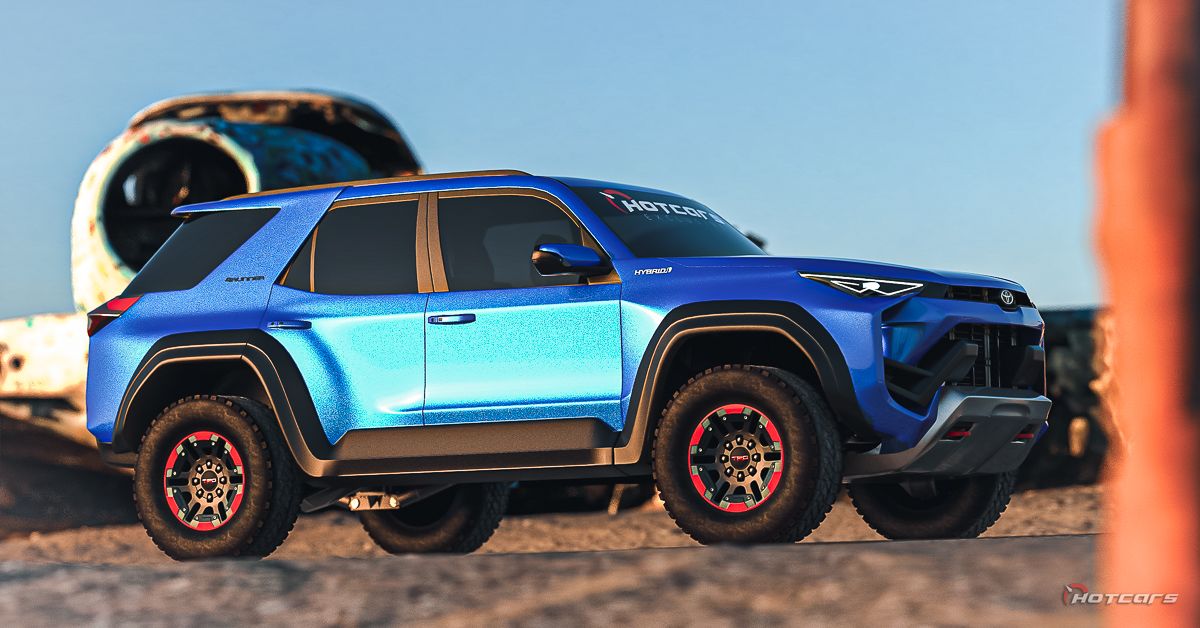The Future of Fuel Efficiency: A Look at the 2025 Toyota 4Runner’s Potential Fuel Economy
Related Articles: The Future of Fuel Efficiency: A Look at the 2025 Toyota 4Runner’s Potential Fuel Economy
Introduction
With enthusiasm, let’s navigate through the intriguing topic related to The Future of Fuel Efficiency: A Look at the 2025 Toyota 4Runner’s Potential Fuel Economy. Let’s weave interesting information and offer fresh perspectives to the readers.
Table of Content
The Future of Fuel Efficiency: A Look at the 2025 Toyota 4Runner’s Potential Fuel Economy

The Toyota 4Runner, a rugged and capable SUV, has long been a favorite among off-road enthusiasts and families seeking adventure. However, its fuel efficiency has historically lagged behind competitors. As the automotive industry rapidly embraces electrification and stricter fuel economy regulations, the 2025 Toyota 4Runner’s fuel efficiency stands as a crucial factor in its continued success.
While specific details regarding the 2025 4Runner’s fuel economy are not yet available, several factors suggest a potential shift towards improved efficiency. These factors include:
1. Technological Advancements in Engine Design: Toyota has consistently demonstrated its commitment to developing advanced engine technologies. The 2025 4Runner could potentially benefit from advancements in direct injection, variable valve timing, and turbocharging, all of which contribute to better fuel consumption.
2. Hybrid and Electric Powertrain Options: The automotive industry is moving towards electrification, and Toyota is a pioneer in hybrid technology. The 2025 4Runner could feature a hybrid powertrain, combining a gasoline engine with an electric motor for enhanced efficiency. A fully electric 4Runner, while less likely in the immediate future, remains a possibility for the long term.
3. Weight Reduction and Aerodynamic Optimization: Lighter vehicles consume less fuel. Toyota could incorporate lightweight materials and optimize the 4Runner’s design for better aerodynamics, contributing to improved fuel efficiency.
4. Advanced Transmission Technologies: Modern transmissions with more gears and intelligent control systems can optimize engine performance for fuel economy. The 2025 4Runner could feature a refined transmission that enhances efficiency.
5. Regulatory Pressure: The Environmental Protection Agency (EPA) and other regulatory bodies are imposing increasingly stringent fuel economy standards. Toyota, like other manufacturers, will need to comply with these regulations, driving innovation and efficiency improvements in the 4Runner.
The Importance of Fuel Efficiency:
The 2025 Toyota 4Runner’s fuel economy is crucial for several reasons:
- Cost Savings: Improved fuel efficiency translates to lower fuel costs for owners, reducing their overall expenses.
- Environmental Responsibility: Reduced fuel consumption leads to lower greenhouse gas emissions, contributing to a cleaner environment.
- Competitive Advantage: In a market increasingly focused on fuel efficiency, the 4Runner’s competitiveness will be directly influenced by its fuel economy.
- Consumer Demand: Consumers are becoming more conscious of fuel efficiency, and a fuel-efficient 4Runner will be more appealing to a wider audience.
FAQs on the 2025 Toyota 4Runner’s Fuel Economy:
Q: What is the expected fuel economy of the 2025 Toyota 4Runner?
A: Specific fuel economy figures for the 2025 4Runner are not yet available. However, based on industry trends and Toyota’s commitment to efficiency, it is reasonable to expect improvements over the current model.
Q: Will the 2025 Toyota 4Runner be available as a hybrid or electric vehicle?
A: While Toyota has not officially confirmed hybrid or electric versions of the 4Runner for 2025, the possibility remains open. The company’s focus on electrification suggests that a hybrid or electric 4Runner is a viable option in the future.
Q: What factors will influence the 2025 Toyota 4Runner’s fuel economy?
A: Several factors will influence the 2025 4Runner’s fuel economy, including engine technology advancements, hybrid or electric powertrains, weight reduction, aerodynamic optimization, and advanced transmission technologies.
Q: How will the 2025 Toyota 4Runner’s fuel economy impact its off-road capabilities?
A: While fuel efficiency is important, Toyota will likely prioritize the 4Runner’s off-road capabilities. Any fuel economy improvements are expected to be achieved without compromising the vehicle’s legendary off-road performance.
Tips for Improving Fuel Efficiency in Any 4Runner:
- Maintain Proper Tire Pressure: Underinflated tires increase rolling resistance, reducing fuel efficiency.
- Drive Smoothly: Aggressive acceleration and braking waste fuel. Drive smoothly and anticipate traffic flow.
- Avoid Excessive Idling: Unnecessary idling consumes fuel. Turn off the engine when waiting for extended periods.
- Minimize Cargo Weight: Excess weight reduces fuel efficiency. Remove unnecessary items from the vehicle.
- Use Cruise Control: Cruise control helps maintain a steady speed, improving fuel economy on highways.
Conclusion:
The 2025 Toyota 4Runner’s fuel economy is a crucial factor in its future success. While specific details are still under wraps, the potential for significant improvements exists. Toyota’s commitment to innovation, combined with industry trends and regulatory pressure, suggests that the 4Runner will embrace efficiency without sacrificing its rugged character. The 2025 4Runner promises to be a more fuel-efficient and environmentally responsible SUV, while maintaining its reputation for off-road prowess and reliability.








Closure
Thus, we hope this article has provided valuable insights into The Future of Fuel Efficiency: A Look at the 2025 Toyota 4Runner’s Potential Fuel Economy. We thank you for taking the time to read this article. See you in our next article!